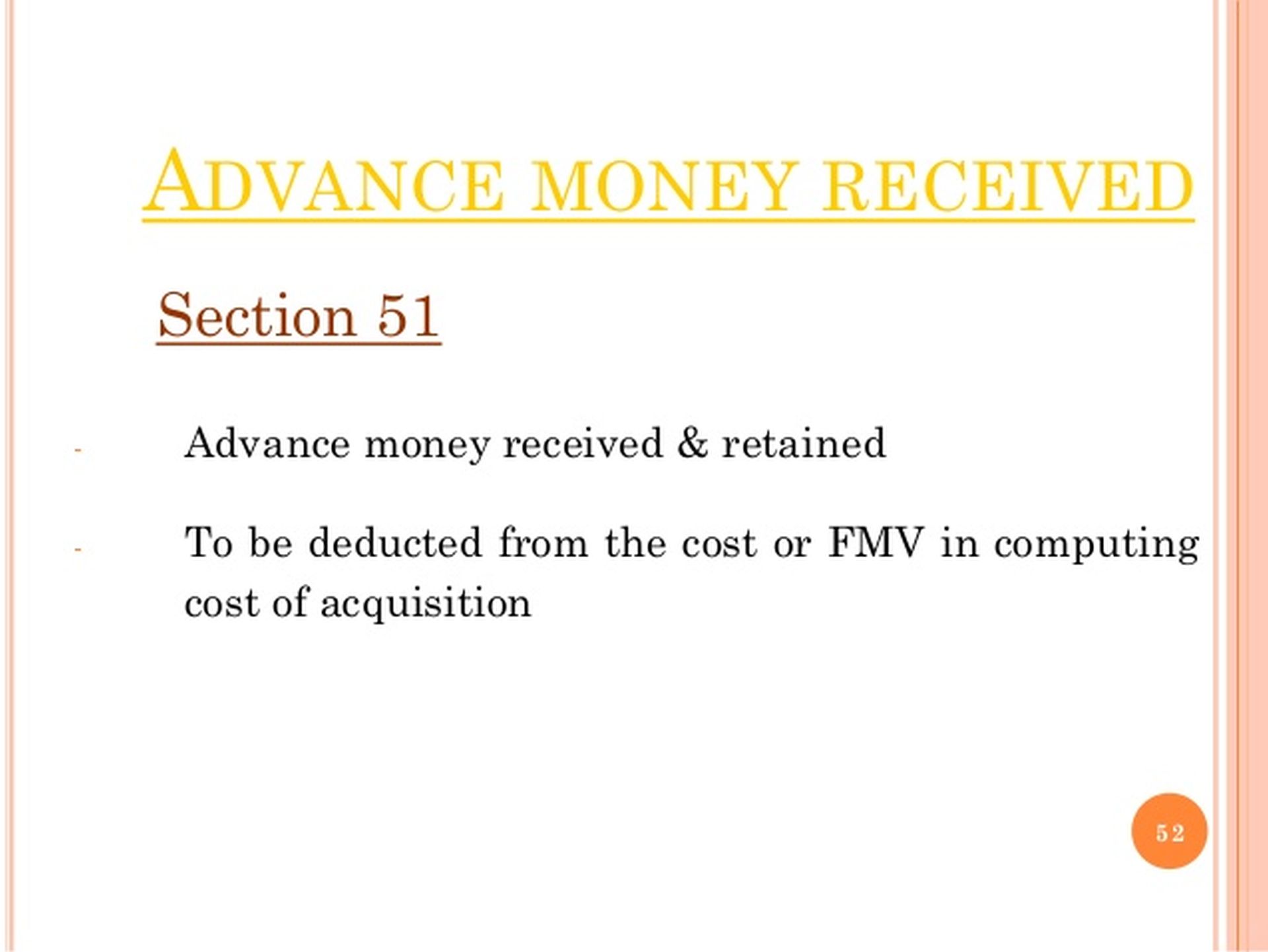The Amendment of Section 51 of the Income Tax Act through Finance Bill

There have been several measures proposed by the government through the Finance (Vol. 2) Bill, 2014. These measures relate to curb tax deference. The most significant is the one where taxation of advance money received in accordance with unprofitable negotiations related to transfer of capital assets under the head income from other sources. To make it more understandable, an “advance” is not an income but it can constitute a liability for performance under a contract. An advance in respect to the capital transaction or revenue transaction can transform from liability to an income or capital receipt, only if based on specific performance in accordance with the contract.

Section 51 of Income Tax Act Explained
The Section 51 of the Income Tax Act deals with forfeiture of the advance money received that has been received during the process of transferring the capital asset.
Conditions for the applicability of Section 51 of Income Tax Act
Based on the induction of the above-said part, several conditions were laid, which were to be satisfied in order to justify the applicability of Section 51 of the Income Tax Act in any situation. The conditions stated are:
- The presence of a capital asset is mandatory
- The capital asset that has been mentioned should be the primary subject matter of the negotiation for its transfer.
- Section 51 can only be applied if the assessee have received and retained the advance in question.
In case, if on a subsequent date the capital asset is transferred, the advance in question will be deducted from the cost of acquisition of the asset. The main purpose for doing this is to compute the capital gain.
The provisions under Section 51 of the Income Tax Act presupposes that the assesse is in the possession of an advance and based on that it operates to reduce the cost of the asset.
Amendment of Section 51 through the Finance Bill, 2014
With the Finance Bill expanding the outlook of the said section, the following was included in Section 51 since 1st April, 2015:
“Provided that where any sum of money, received as an advance or otherwise in the course of negotiations for transfer of a capital asset, has been included in the total income of the assessee for any previous year in accordance with the provisions of clause (ix) of sub-section (2) of section 56,then, such sum shall not be deducted from the cost for which the asset was acquired or the written down value or the fair market value, as the case may be, in computing the cost of acquisition.”
The above mentioned amendment overrules the decade old judgment of the Supreme Court in case of Travancore Rubber & Tea Co. Ltd. vs. CIT [2000] 109 Taxman 250 (SC), where the Supreme Court in the context of aborted transfer transaction of rubber trees, upheld that the forfeited money is a capital; receipt and hence, not eligible to tax. And as per the stated provisions under Section 51 of the Income Tax Act, the SC said that the forfeited amount should be reduced from the cost of acquisition of such capital asset.


 ITAT Amritsar: No Section 269SS Violation for One-Time Cash Payment Before Sub-Registrar
ITAT Amritsar: No Section 269SS Violation for One-Time Cash Payment Before Sub-Registrar  Tax Officials Unleash Digital Dragnet: How New Raid Powers Redefine Privacy, Property Rights in India and likely to Fuel Corruption
Tax Officials Unleash Digital Dragnet: How New Raid Powers Redefine Privacy, Property Rights in India and likely to Fuel Corruption  Income Tax Department Rewards for Reporting Tax Evasion: A Comprehensive Guide
Income Tax Department Rewards for Reporting Tax Evasion: A Comprehensive Guide  Forfeiture of Gratuity by Employer- What are the Remedies for an employee- Can employer be challenged?
Forfeiture of Gratuity by Employer- What are the Remedies for an employee- Can employer be challenged?  Employer can forfeit gratuity of an employee in case of moral turpitude
Employer can forfeit gratuity of an employee in case of moral turpitude  Diving Deeper: The Impact of the New Tax Bill on Dairy and Farming Income
Diving Deeper: The Impact of the New Tax Bill on Dairy and Farming Income